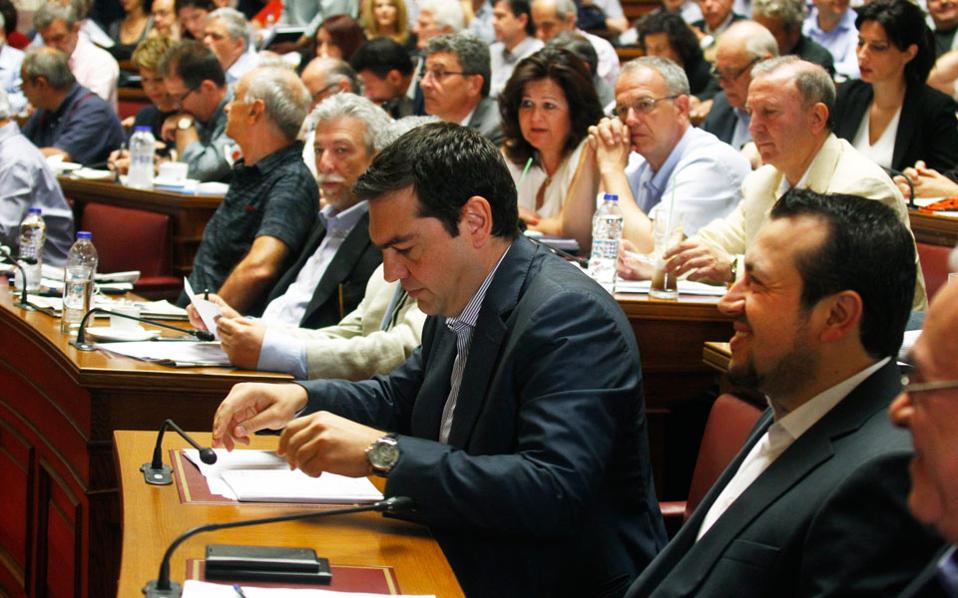Tsipras seeks party backing after abrupt concessions

Greek Prime Minister Alexis Tsipras appealed to his party's lawmakers on Friday to back a tough reforms package after abruptly offering last-minute concessions to try to save the country from financial meltdown.
After walking into a party meeting to applause, Tsipras rallied his SYRIZA lawmakers to throw their weight behind the new proposals ahead of a snap vote in parliament on the negotiations, urging them to help keep Greece in the euro.
"We are confronted with crucial decisions," a government official quoted Tspiras telling his SYRIZA lawmakers.
"We got a mandate to bring a better deal than the ultimatum that the Eurogroup gave us, but certainly not given a mandate to take Greece out of the eurozone, he said. "We are all in this together."
It is unclear whether all the creditors would back the latest reforms package, which was strikingly similar to the terms Greece had rejected in a referendum that Tsipras had called in June.
France, Greece's strongest supporter in the eurozone, rushed to offer praise with President Francois Hollande calling the offer "serious and credible." Eurogroup head Jeroen Dijsselbloem called it a "thorough piece of text" but declined to go into specifics.
"Broad support in Greece gives it more credibility, but even then we need to consider carefully whether the proposal is good and if the numbers add up," he told reporters. "One way or the other, it is a very major decision we need to take."
The lenders' backing is crucial for eurozone leaders to support the proposals. Dijsselbloem, European Commission President Jean-Claude Juncker, European Central Bank President Mario Draghi and International Monetary Fund head Christine Lagarde were to make a first assessment of the plans by teleconference, EU sources said.
European markets rallied on the improved prospects for a last-ditch deal to keep Greece in the currency area, while Italian, Spanish and Portuguese bond yields fell, reflecting perception of reduced risk.
Nevetheless, Greece would have to overcome a hardening of attitudes towards it among its eurozone partners, including Germany, which has contributed more to Greek bailouts than any other country. Some, including a senior member of German Chancellor Angela Merkel's party, greeted the latest reform proposals with skepticism. Latvia's prime minister said he would not accept any proposal that includes a debt writedown.
Finance ministers of the 19-nation euro area will meet on Saturday to decide whether to recommend opening negotiations on a third bailout program for Athens despite widespread exasperation at the five-year-old Greek debt crisis.
Greece asked for 53.5 billion euros ($59 billion) to help cover its debts until 2018, a review of primary surplus targets in the light of the sharp deterioration of its economy, and a "reprofiling" of the country's long-term debt.
But the plan could cause trouble for Tsipras at home, from hardliners in his own party as well as his junior coalition ally. Any new deal would also have to be endorsed by national parliaments including in Germany.
"The proposals are not compatible with the SYRIZA program," Energy Minister Panagiotis Lafazanis, who belongs to the hard left wing in SYRIZA, said. He declined to say how he would vote. "We will take it step by step."
A small group of pensioners held a protest outside the finance ministry in Athens and an anti-austerity demonstration is planned for Friday evening.
"The new measures are suffocating," said Irini Skordara, a 79-year-old pensioner, one of dozens of pensioners queuing outside a bank to withdraw their pension. "Better we live poor than to plunge into chaos."
Tsipras has called a snap vote in parliament asking for its backing to negotiate a list of "prior actions" – measures his government would take to convince creditors of its intent ahead of negotiations and to secure the first disbursement.
The latest offer includes defense spending cuts, a timetable for privatizing state assets such as Piraeus port and regional airports, hikes in value added tax for hotels and restaurants and slashing a top-up payment for poorer pensioners.
"The 'no' in the referendum appears to be turning into a 'yes' from Tsipras," Commerzbank analyst Markus Koch said.
Greek banks have been closed since June 29, when capital controls were imposed and cash withdrawals rationed after the collapse of previous bailout talks. Greece defaulted on an IMF loan repayment the following day and now faces a critical July 20 bond redemption to the ECB of 3.49 billion euros, which it cannot make without aid.
The country has had two bailouts worth 240 billion euros from the eurozone and the IMF since 2010, but its economy has shrunk by a quarter, unemployment is at more than 25 percent and one in two young people is out of work. [Reuters]





